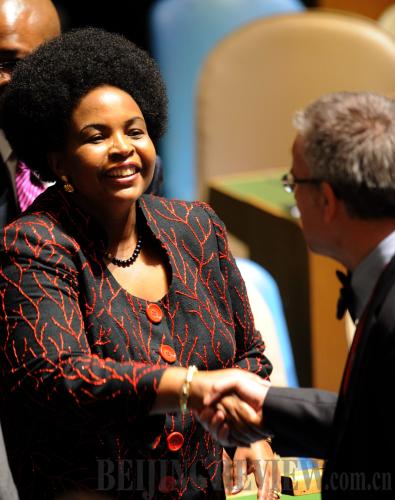|
 |
|
SHARING THE JOY: South Africa's Minister of International Relations and Cooperation Maite Nkoana-Mashabane (left) receives congratulations after South Africa won a non-permanent seat on the UN Security Council on October 12, 2010 (SHEN HONG) |
Structural problems in the international system make the reform even more difficult. Regarding the UN Security Council reform, countries can be divided into four groups according to their stance on this issue—radicals, conservatives, moderates and promoters. Among them, the radicals are the focus of the dispute.
Radicals consist of two types of countries. The first type comprises developed countries that were defeated in World War II and subsequently became economically and politically strong. Japan and Germany belong to this group. They are eager to reform the current international system and thoroughly get rid of their historical burden by becoming permanent members of the UN Security Council. The second type comprises emerging countries, such as India and Brazil. They are political radicals in international relations. They are eager to increase their political power and status by becoming Security Council permanent members. It is only natural that these two groups have worked together to achieve their shared goal. But the countries' radical actions have hindered their progress.
Of the five permanent members, all of which support the reform, Britain and France are relatively more active. But as countries with vested interests, they are also subject to the impact of any reform. In addition, they have their own problems and concerns. Therefore, they have adopted a conservative stance regarding the reform.
Some other countries are at a relative disadvantage as they compete for permanent seats. However, they don't want to see their regional competitors win. They also hope to have an opportunity to get permanent seats. Their policies are quite moderate, and they have formed the Uniting for Consensus movement to restrain radical countries.
Some UN agencies and nongovernmental organizations form the fourth group—the promoters—based on their desire to maintain and promote multilateralism.
Some small and medium-sized countries, which are comparatively weak, act as centrists. As other groups try to gain their support, they wait and hope to use their leverage to achieve benefits for themselves. Although African countries have chosen to take a unified stance through the African Union, agreement is not perfectly unanimous. This adds to the complexity of the reform process.
No matter how many rounds of intergovernmental negotiations have been conducted, as long as no consensus is reached on the standards, agendas and procedures of the reform, no substantial progress can be achieved. The amendment of the UN Charter remains a significant problem. The UN Charter prescribes the composition and power of the UN Security Council. To reform the Security Council, the UN Charter must be amended. Based on UN regulations, amendments must be approved by at least two thirds of all General Assembly member countries and by all the five permanent members of the Security Council. This will be a challenging task.
Although the composition of the new council may be favorable to reform, it will still be difficult to make any breakthrough. Reform needs to advance step by step through intergovernmental negotiations. The key is to find a compromise acceptable to all parties. This obviously cannot be done overnight.
China's stance
China is in a favorable position on the reform of the UN Security Council. As a permanent member of the UN Security Council, it has veto power. No one can ignore China's influence. No matter how reform goes, China will be able to keep its current status. Reform should promote a multi-polar world with a strengthened international balance of power, democratic international relations and a rational international system. This is just the goal of China.
With previous experience in tough negotiations, China has good knowledge of the reform. It has adopted rational, prudent and responsible policies in this respect. It advocates a comprehensive solution with priority given to developing countries, especially African countries. It is essential for China to take into account the interests of all parties on a multilateral basis.
The new council provides new opportunities for China to cooperate with other emerging countries. It is also important for China to pay attention to those emerging countries, while continuing to support African countries' efforts to obtain permanent seats.
The author is deputy director of the Department for International Strategic Studies at the China Institute of International Studies
UN Security Council Membership In 2011
Permanent members: China, France, Russian Federation, the UK and the United States
Non-permanent members: Bosnia and Herzegovina, Germany, Portugal, Brazil, India, South Africa, Colombia, Lebanon, Gabon and Nigeria
(Source: www.un.org) | 